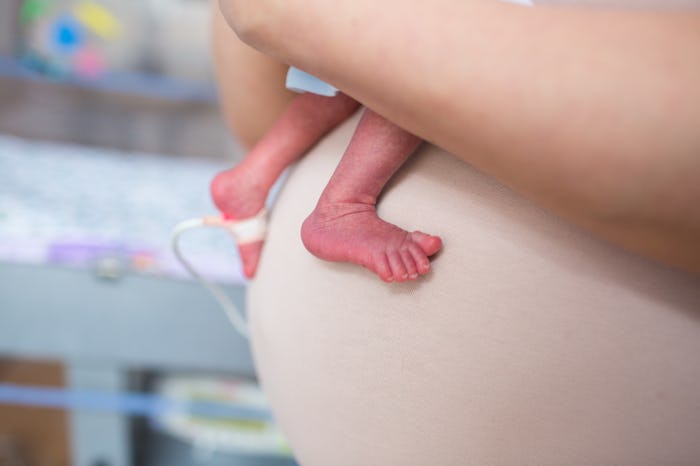Life

How Much Should A Preemie Baby Eat? An Expert Explains
When you have your baby early you basically throw away any conventional resources about what to expect, because it can be so different. Guidelines for things like how much should a preemie baby eat, what they should eat, and how often they should eat can vary from the guidelines for babies that were born at term, and can change as your baby goes home from the hospital. They often depend on various factors, too, such as a baby's size at birth, how well they are gaining weight, and their overall health.
Per the American Academy of Pediatrics (AAP), feeding a premature baby can be a totally different experience than feeding a term infant. Underlying health problems or their small size can interfere with being able to eat from your breast or a bottle, but they also may require IV fluids or a feeding tube to get the nutrition they need. "Your baby will be ready to come home once she's breathing on her own, able to maintain her body temperature, able to be fed by breast or bottle, and gaining weight steadily," the site reads.
So, then what? In the neonatal intensive care unit (NICU) you have a plan for when and how much to feed your preemie, so it's natural to have questions about how to continue to nourish them once you go home from the hospital. To learn more about the balancing act of feeding preemie babies, Romper spoke to Dottie Land Jones, MSN, APRN, NNP-BC of Houston Methodist Sugar Land Hospital, Megan Sandlian-Tews, RN, BSN of Denver Health Medical Center, Debra Lanning, NNP, ARNP of Mednax Medical Group in Tacoma, Washington, and Nancy Forsyth, MSN, RN, NNP-BC, of Beebe Healthcare in Lewes, Delaware, all experienced neonatal nurses.
The good news, according to Jones, is that parents of preemies will leave the hospital with a detailed plan for how to feed their babies. "By the time these babies are going home, parents should be instructed on how much they should be eating," she says. "I would never discharge a preemie without a set minimum amount of formula or breast milk for each feeding. By the time we discharge they have demonstrated they can take that minimum amount regularly."
The amount depends on what your individual baby needs to grow and thrive, too, Lanning says. "By discharge the feeding plan should be established on what goal volume the infant needs for adequate growth. This is typically somewhere between 120 to 180 milliliters per kilogram per day," she says. And Sandlian-Tews explains that, "a 2 kilogram (4.4 pound) baby should be optimally taking 45 milliliters (about 1.5 ounces) every three hours."
The United States National Library of Medicine site Medline plus explains that preemies often have different needs when it comes to what they eat, too. "Human milk from the baby's own mother is the best for babies born early and at very low birth weight. Human milk can protect babies against infections and sudden infant death syndrome (SIDS)," the site reads.
It's important to recognize that preemie babies have special needs and there may not be a one-size-fits-all feeding plan that works for all babies.
But, as the same site explains, your baby might need more calories to thrive than are found in breast milk, which means receiving fortified breast milk or a higher calorie formula. "Most preemies that are under 35 weeks need some type of fortification. This differs from facility to facility," Jones explains. "Some fortify breast milk, and we tell parents to replace two feedings a day with Neosure — a high calorie formula."
Per Sandlian-Tews, no matter how they are fed, the main metric for determining if they are getting enough of the right food is how well they are gaining. "Weight gain is an important indicator for both breast and bottle fed infants; after discharge the pediatrician should be following the weight closely," she says. "Fortification is indicated if an infant has poor weight gain or is unable to tolerate a volume that would give sufficient calories. Babies who are easily fatigued may not be able to take enough by mouth of standard concentration formula or breast milk."
As for how much they should gain, Lanning explains that a premature baby should gain 15 to 20 grams a day. "Anytime they are falling off their growth curve and not gaining, we first try to increase their volumes," she says. "If they are unable to take more food, we add the fortification or use Neosure 22 or 24 calorie formula for every feeding."
Forsyth agrees that the best indicator they are getting enough to eat is weight gain, adding that parents can watch their baby for other cues, too. "Parents should track whether or not their baby is able to take the recommended volume, too fatigued to finish feeding, able to go two to three hours between formula feeds, waking up early and hungry," she says, "and if they are voiding and stooling."
Ensuring that a breastfed preemie is getting enough to eat is a bit more complex, says Lanning. "If the baby is a great breastfeeder, we trial them off supplement to see if they are transferring enough milk. If they are still gaining, they go home breastfeeding," she says. "I try and teach the mother how to monitor her pumping volumes before and after baby nurses so she can start to see when baby is transferring better." And according to Sandlian-Tews, "the usual markers of satiation and breasts emptying apply to preemies as well."
It's important to recognize that preemie babies have special needs and there may not be a one-size-fits-all feeding plan that works for all babies. "Every baby is different. Preemies are different from full-term babies, and preemies are different from other preemies," Forsyth says. "Your baby is not the same as your friend's baby, and your baby may have different needs."